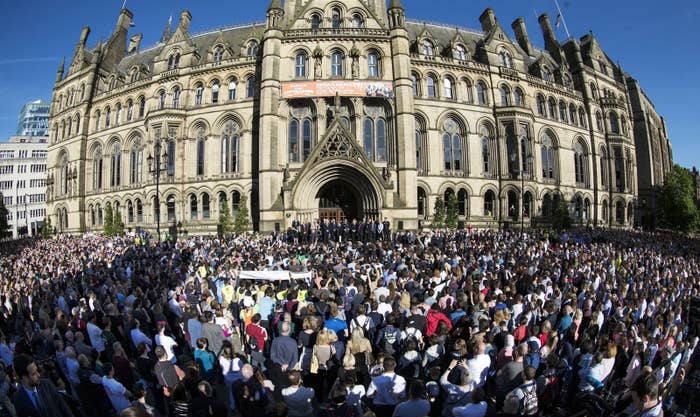
The Manchester Arena bomb, which killed 22 people and injured more than 100, could potentially have been averted by security services, according to a new report from a senior barrister and former terrorism law reviewer.
David Anderson QC, who was asked by the government to review the terrorist attacks in Manchester and London during 2017, said in a report released on Tuesday that MI5 had received multiple reports about Salman Abedi, the Manchester suicide bomber, before the attack, which took place on 22 May this year.
"On two separate occasions in the months prior to the attack, intelligence was received by MI5 whose significance was not fully appreciated at the time," the report said.
"It was assessed at the time to relate not to terrorism but to possible non-nefarious activity or to criminality on the part of Salman Abedi.
"In retrospect, the intelligence can be seen to have been highly relevant to the planned attack."

Abedi was first identified by MI5 in 2014 as one of 20,000 people of interest who merited further investigation – and the report revealed that there was a meeting to discuss Abedi and several other suspects scheduled for 31 May this year, which turned out to be nine days after the bombing.
Anderson said that while it was not the review's role to point the finger of blame, "It is conceivable that the Manchester attack in particular might have been averted had the cards fallen differently."
In total, MI5 and counterterror police have averted 20 Islamist terror plots in the last four years, the report said. Of those, seven have so far come to trial, resulting in 10 life sentences.
The home secretary Amber Rudd told parliament moments before the report's publication that Abedi was not under active investigation at the time of the attack but was known to security services.
"In early 2017, MI5 nonetheless received intelligence on him, which was assessed as not being related to terrorism. In retrospect, the intelligence can be seen to be highly relevant," she said.
"Had an investigation been reopened at the time, it cannot be known whether Abedi’s plans could have been stopped. MI5 assess that it would have been unlikely."
Referring to the terrorist attacks in London, Anderson was clear that little could have been done to avert them and said there was no cause for alarm or despair:
Most attacks continue to be successfully disrupted, often after intensive and painstaking work, with successful prosecutions and long prison sentences a regular occurrence.
The 20 recently thwarted attacks on which I have been briefed, six of which have already ended with sentences of life imprisonment and with many more trials in the pipeline, are evidence of that. ...
Substantial and appropriate coverage was in place around key individuals, and mechanisms designed to assess risk were working as intended. MI5 and counter-terror Policing got a great deal right: particularly in the case of Manchester, they could have succeeded had the cards fallen differently.
Anderson added however that despite being a subject of interest as part of a closed investigation, MI5 missed an opportunity to add him on a restricted travel list as he travelled from Libya to Manchester in April 2017.
"This would have triggered an alert when he returned shortly before the attack, which could have enabled him to be questioned and searched at the airport by CT [counter terror] Policing under Schedule 7 to the Terrorism Act 2000," he wrote.
Andrew Parker, the director general of MI5, said in a statement that he welcomed Anderson's findings and its "independent assurance of our reviews".
"As I said in October, we and our partner agencies used the harsh light of hindsight under independent challenge to ensure we squeezed every drop of learning out of these dreadful events," he said.
Parker did not comment on Abedi and how the service was in possession of information about him, nor whether action could have been taken sooner.
Cressida Dick, commissioner of the Metropolitan police, said lessons would be learned from the review, but added that terrorism is putting a strain on police resources: "Policing and our colleagues in the fight against terrorism will continue to learn and improve.
"We need to make rapid progress in implementing the recommendations, many of which require new technology, better infrastructures and resources at a time when the threat from terrorism poses significant challenges for police and security services.
Chief Constable Ian Hopkins of Greater Manchester police said: "The size and scale of the threat from terrorism has been made so tragically clear this year. Greater Manchester Police will support Counter Terrorism Policing and the UK intelligence community in its response to this step change in threat and in adopting the recommendations in the Review.
"Further independent scrutiny will follow including inquests into the deaths of those who lost their lives. Greater Manchester Police will support those inquiries and with our partner agencies will continue to support those affected."
Update from Chief Constable Ian Hopkins in response to David Anderson QC report, released today.
Greater Manchester's mayor, Andy Burnham, said the report showed there had been "wrong judgments" by security services in the run-up to the attack.
"I accept its conclusion that there is no way of knowing whether the Manchester attack could have been stopped," he said. "But it is clear that things could – and perhaps should – have been done differently and wrong judgements made. There are lessons to be learned and I think the people of Greater Manchester will appreciate the honesty in which they are being acknowledged."
